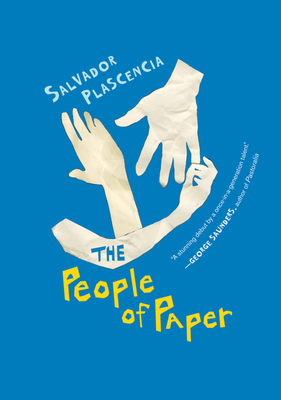The People of Paper (McSweeney's Books, 2005)
A friend lent me this book by Salvador Plascencia, thought I'd like it, as he returned to me my copy of Kundera's Unbearable Lightness of Being. The book was overlarge where width and height were concerned, but a cursory glance through the relatively thin volume showed its post-modern flare, with ever-changing blocks of formatting, black shapes covering up some or all of certain narratives and small illustrations breaking up (and supposedly holding up) the story. These things excited me and I began reading it the next day.

The book centers around Federico de la Fe, father and husband, who must change the straw in their mattress each Tuesday by the river for all the uncontrolled piss he makes at night. His wife, Merced (who loves limes), chooses not to be pissed on anymore and leaves them both. The story springs from this sad point, the narrator changing with each column of text, from Little Merced (the daughter) to Rita Hayworth to Baby Nostradamus and more. Federico tempers his sadness by burning himself, which he hides from Little Merced (who also loves limes). This works for him and he always wears long sleeves. The main narrator is Saturn, that third-person omniscient whom Federico blames for everything, and whom Federico wages a war against with the carnation-chewing gang of the town of El Monte in Southern California. Saturn sees everything, hears everything, is making a history of their lives with his voyeurism.
Oh, yes, there are also the people of paper. A highly skilled origami artist began by reanimating his dead cat with paper organs and paper arteries before working his way up to human organs, and finally whole people of paper (whose fellators develop paper cuts on their tongues or wake up with soggy newspaper skin stuck to them overnight).
Needless to say, there are a great deal of creative elements at work in this book, so much so that to be brief about it is to sound a little ridiculous. His language is something like I have never read, totally casual yet thick with imagination, self-aware but not grievously meta. He brings the reader into a world occupied by obvious creation, occupied by the writer himself. It is a book mired in the sadness of loss and the futility of displaced anger. The characters and their struggles are tied to all who involve themselves in the story and illustrate how personal the act of writing fiction is.
Overall, I would recommend picking it up and giving it a try. It is something different, a little fantastical and very smart.
I will conclude with a small passage from the beginning that I just turned to:
Saturn
Saturn was aligned directly over Federico de la Fe, following him wherever he went, budging a half a space centimeter for every five hundred land miles de la Fe and Little Merced traveled. But once Federico de la Fe retreated into the lead shell, safely hiding from view and refusing to reemerge until the weight from the air was lifted, Saturn withdrew into his orbit and faded into the blur of the chalky galaxy.


